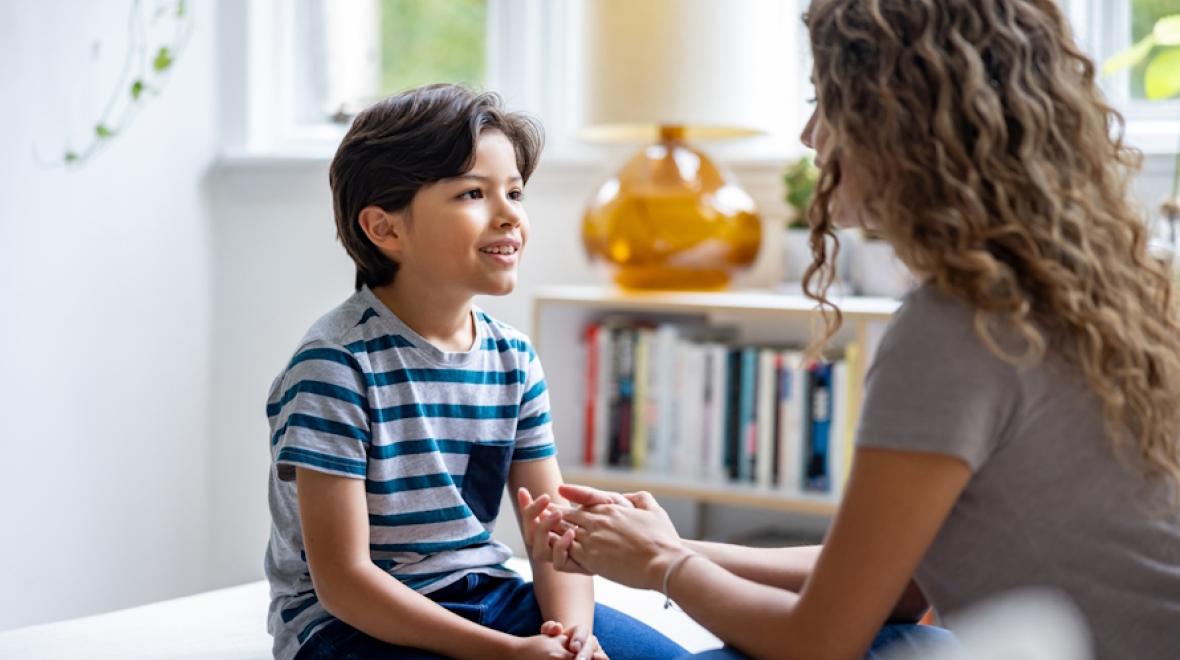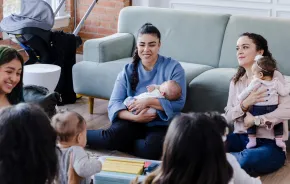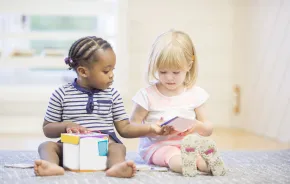
My son was in kindergarten when I found him playing with an unwrapped tampon … attached to an action figure as a jetpack. I was both embarrassed and felt a sense of urgency to retrieve it.
“That is not a toy! May I have it back please? It doesn’t belong to you.” My discomfort only seemed to make him curious.
“O.K. mom, but what even is it?” he asked.
As open and progressive as I’d like to think I am as a mother, I realized that my gut reaction to seeing my son play with a tampon surprised even me. I worked through my discomfort and disclosed as much as I deemed appropriate.
“You know how we talked about how amazing it is that babies come out of a mother’s womb? Well, if a baby is not made, then a woman doesn’t need the lining of her womb so she sheds it,” I explained best I could. “That creates blood, and we use tampons to stop the blood; sort of like how you use toilet paper to stop a bloody nose.”
He nodded and handed over the tampon.
The conversation surrounding my period seems to surface if I’m too crampy, or weepy or exhausted to participate in our usual activities. Most recently, when our puppy was on her estrus cycle, my son knew to expect blood and he wasn’t at all freaked out. Instead he was attentive, affectionate and compassionate, and even volunteered to change puppy pants. I’d like to think that I’m raising a son who will be supportive and aware of feminine reproductive issues, and I’m happy I started the conversation when I did, even if he was a bit young.
When to talk to kids about menstruation
“I don’t think there’s any such thing as too young. I think we as parents know our kids best and we know how to temper language or use what’s developmentally appropriate language for our kiddos,” says Liz, a coach, mom, menstruality mentor and founder of Raising Flora, a period-positive consultancy that offers classes, virtual teas and private sessions to parents.
“I encourage parents to be bold enough to share our own menstruation experiences and to help our kids respond with empathy. Allyship comes from empathy and then we can turn empathy into compassion and allyship with our actions,” says Liz. “One of the most important things we can teach our children is that we’re different on each day of our cycle. In our culture, we give a lot of credence to that blossoming summer ovulating woman who can do it all, who’s like on top of everything at work, nurturing at home and is super sexy. But that’s only a piece of our cycle. And that’s not who we are every day, and so it’s about being honest within our families, like here’s what day 14 feels like to me.”
Period-positivity in the gaming world

I was excited to revisit the menstruation conversation with my son when I learned that Essity, a hygiene and health company, along with Saba, a feminine care brand, launched a Roblox world called V-Land, with hopes to normalize menstruation and encourage families to play in a metaverse where taboos are removed. I was eager to see what my Roblox enthusiast would think about it. My son reluctantly agreed to play, and not before turning off his “joins,” so people he normally plays with in Roblox couldn’t see or join him in V-land. We both entered the pink, fleshy looking realm with curiosity.
“Oh no! The water is red! What do you think that is? Blood?” He seemed both amused and shocked. “Oh no there’s other people in the game! Why am I here? I guess I’ll be the tampon costume. Lol, look!” He generated a tampon-shaped car, his avatar hopped in and we both literally fell out laughing. While the laughter here was probably a normal response to an unusual game, I couldn’t help but to think back to middle school, when girls were teased for smelling “not so fresh” or soaking through white jeans.
“I think I’m gonna regret playing this game later,” he added.
“Why?” I asked.
“I don’t know … can I swim in the blood pond? Oh no! You can swim in the blood pond! This is terrible! I don’t feel like I’m supposed to be in this game. It feels inappropriate somehow. Look, Mom, some other guy is in the tampon costume. Look at him go! I need to get out of here.” He then abruptly closed the laptop.
Destigmatizing periods
“I’m not surprised that your son would go into that Roblox world thinking. ‘Is this for me?’ Because we haven’t made it for him in real life, we’re just not there yet in our culture,” explained Liz.
It’ll be a great day when people who have periods no longer feel the need to hide the amazing part our bodies play in the human reproductive cycle and everything that comes with it from friends, bosses, peers and even our own children. Will we ever get there?
“I’m an optimist and I absolutely believe in the potential to get there,” says Liz.
“I do think that my daughter and your son’s generation is going to be more open. We see periods in ‘Babysitters Club,’ we see periods in ‘Blackish.’ We see periods being talked about, being made more normal in pop culture and yet we still see so much hiding and so much discomfort.”
So why is it so important for parents to talk to their children of all genders openly about menstruation?
Liz hopes that the discussion begins at home with our kids, and then carries over into schools and beyond. But there’s still much progress to be made. She points to a State of the Period 2021 poll by Thinx, that found that 70% of students don’t feel that schools foster a period-positive environment and instead makes them “especially self-conscious.” Students reported not feeling comfortable talking about periods or going to class while menstruating and 76% said that there are negative associations with periods being “gross” and “unsanitary” and that biology of frogs is taught over lessons about female anatomy.
Misinformation, shame and discomfort leads to a global culture where menstruation is still a taboo. As a result code words are used for menstruation, and hygiene products such as menstrual napkins and tampons are covertly hidden in bathrooms, bookbags and the pockets of those of us fortunate enough to have access to them. In Jamaican patois for instance, the word “bloodclaat,” that specifically refers to menstrual napkins or cloth, is used as a swear. In India menstruating women are excluded from daily activities such as entering kitchens, taking baths or attending religious activities. It’s been reported that 23% of women in India drop out of school when their periods start.
Why should half of the population be taught to feel shame around what our bodies do naturally? Especially when nearly 800 million women, girls and transgender men menstruate?
“I think what is relevant in today’s culture is that it’s easy for us to like play into being objectified and sort of self-objectify and see our bodies from the outside and so that self-objectification leads to so many of us saying like, I hate fill in the blank, about our body and so many people are at the point where they’re just like, ‘I hate my period.’ It will take deep mom-work to reconnect with our own bodies so that we can evolve our tweens to have a better possible set of experiences for themselves. We don’t want them to have trauma, but we need to let them find their own way through how they know their body, how they love their body and manage their cycle with compassion — self-compassion, really" says Liz.
Changing the conversation around periods

As parents we have the opportunity and the power to change the conversation surrounding menstruation in our own homes and beyond, even if we are up against external cultural and societal barriers. Here’s a few things you can do:
Tips to foster period-positivity in kids:
- Start the conversation early and with age appropriateness, you can always add more information when you feel they’re ready for it.
- Menstruation is not just a girl thing, talk about it with kids of all genders so that they understand what’s going on.
- Don’t look embarrassed or get weird, be straightforward and confident. If we’re going to normalize menstruation, we should model this behavior for our kids and be normal.
- Don’t use the word “sanitary” when referring to menstrual cloths or napkins, it reinforces negative stigma and the idea that menstrual blood is dirty.
- Talk about your own menstrual cycle and how you’re feeling because of it, this will give you kids a chance to understand what you’re experiencing.
- Don’t use code words when referring to menstruation or female anatomy. This can reinforce feelings of hiding and shame. It’s ok to say “vagina” and “menstruation.”
- Book a consultation with Raising Flora, she can even walk you through your tween’s first period.
- Take the Period Positive Pledge, and find out how to foster period positive schools.
More important conversations with kids13 Tips for Talking to Your Child About Their Autism 8 Questions to Get Your Kids Talking About School |











